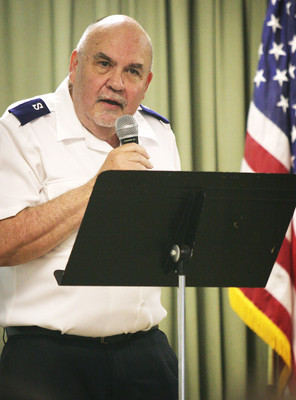Addiction treatment cut back
In yet another sign of tough economic times, the local Salvation Army beginning Friday will no longer provide free inpatient addiction rehabilitation services to people referred there by the Clark County District Court system as a condition of their parole or probation.
The move could force judges to send more people with substance abuse or gambling problems to already overcrowded jails instead of to treatment.
About 30 percent of those who enroll in the agency's 35-year-old adult rehabilitation program have been mandated by the court to undergo residential treatment at the Salvation Army, said Maj. William Raihl, Clark County coordinator for the agency.
Most of them can't afford to pay for treatment.
Neither, it turns out, can the Salvation Army anymore.
"Everybody's out of money," Raihl said. "It's horrible for everyone."
Judges often search for alternatives to jail when dealing with defendants who have addiction problems and whose crimes are related to those addictions, District Court Judge Jackie Glass said.
The options were already limited before the Salvation Army's decision.
"Now, this makes it even worse," Glass said. "There's going to be people who end up in prison or jail that probably wouldn't be there but for the fact there's no place for them to go get the treatment they need."
The Salvation Army program that provides substance abuse and gambling addiction treatment services to about 1,600 men and women annually has been operating in the red for years, Raihl said.
The program's deficit added up to about $2 million over the past five years, he said.
It's operating with a nearly $500,000 deficit this year.
Increased expenses, a slowdown in thrift store sales and cuts in funding have contributed to the problem.
"It's at a point where we can no longer sustain that type of deficit and continue to operate our other programs," Raihl said.
The Salvation Army has 111 beds for people in its adult rehabilitation program. People generally stay five or six months for treatment.
The agency still plans to provide free addiction services to those who enroll independently and can't afford to pay, including homeless men and women, Raihl said.
It also will still provide services to those referred by local courts who can afford to pay $50 a day.
"That's quite reasonable compared to private treatment programs," Raihl said.
The court also refers people to WestCare's addiction treatment program, which has 90 beds.
Those beds are usually full, however, and the program doesn't have the capacity to absorb those who now will be turned away from the Salvation Army, said Kirby Burgess, vice president of WestCare.
"We're seeing more and more folks in need, especially with the economic downturn," Burgess said. "Folks with no insurance, no money, no place to stay."
WestCare may be able to offer increased outpatient counseling until beds open up to help fill the gap left by the Salvation Army's decision, he said.
Glass said people already sometimes wait for months in jail for beds to open up at WestCare or the Salvation Army.
Raihl said the Salvation Army has approached the state, county and others for help funding the program.
"Each of them has said, 'We love your program, but we can't help you with funding,'" he said.
It's a problem nonprofits are increasingly facing in difficult economic times. Many report making due with less while the need for their help is increasing.
"We ended up laying people off," said Phillip Hollon, director of residential services for Catholic Charities of Southern Nevada. "We eliminated five positions. That only adds more people out there who need help."
Hollon said the charity is facing cuts of 20 percent in county funding for its dining room and residential work programs for fiscal year 2008-09. He's hoping that doesn't mean fewer people will get help.
"The last thing I want to do is reduce services," he said. "Maybe there will be a turnaround. I never want to give up hope."
WestCare also has had to tighten its belt, Burgess said. It has laid off some employees and left other positions unfilled.
"We've been hit by cutbacks like everybody else."
But WestCare's addiction recovery program is in good financial shape so far, he said.
"We've taken a leap of faith that the community will support us, and they have."
Contact reporter Lynnette Curtis at lcurtis@reviewjournal.com or 702-383-0285.


















